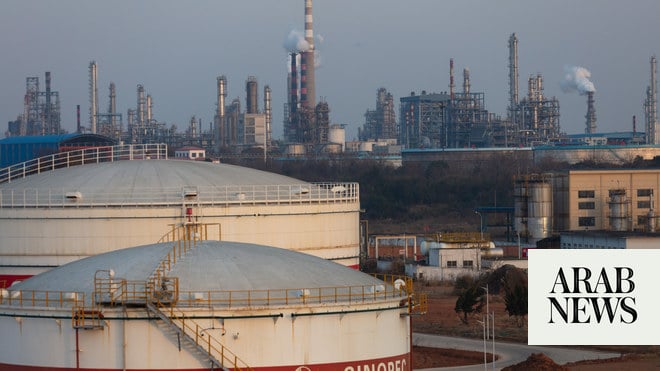
Emergency talks weigh up further supply cuts as coronavirus breakout hits output in world’s second-largest market
BEIJING: Fears of an economic slowdown, fueled by the coronavirus slashing output in China, has shone a spotlight on OPEC, whose oil is heavily bought by the world’s second-biggest economy.
“China has become increasingly important for OPEC countries in recent years,” research group JBC Energy said.
In total, more than two-thirds of China’s crude imports comes from the Organization of Petroleum Exporting Countries and Russia.
Following a slump in prices, OPEC and its key oil-producing ally Russia have been meeting this week to discuss the situation.
In an apparent sign of the difficulties involved, OPEC delegates meeting in Vienna announced that the talks would continue on Thursday.
However, it is not a formal meeting on output, as was the case in December when OPEC and its OPEC+ allies extended an existing agreement to curb crude production to prop up prices.
Saudi Arabia and Russia are the biggest foreign suppliers of crude to China.
But as a whole, OPEC would be seriously affected by a slump in Chinese oil demand.
Oil prices have fallen heavily overall during the past couple of weeks on fears of a China-fueled global economic slowdown.
The price falls have raised eyebrows at OPEC, whose 13 member nations pump out around one-third of global crude and are anxious to safeguard revenues, faced with weaker Chinese demand.
“China is the world’s second- largest oil-consuming country, contributing 13 percent of global oil demand,” said Yujiao Lei, analyst at commodities research group Wood Mackenzie.
“As a fast-growing economy, more than one-third of global oil demand growth comes from China.
“Without sufficient domestic supply, China’s oil dependency keeps rising, which makes it one of the most important markets for OPEC,” Lei added.
Saudi Arabia said this week that the impact of the virus on oil demand was “extremely limited” and “driven by psychological factors.”
Nevertheless, and according to JBC Energy, “OPEC/OPEC+ only really have one option, and that is to announce further supply cuts, otherwise the price (of oil) is likely to fall further” in the absence of a major development on containing the virus.
Awaiting a possible reduction in OPEC production, Bloomberg has reported an increased interest in demand for oil tankers to store crude caused by a drop in refinery activity.
Oil prices are down around 15 percent since the start of the year after benchmark contracts Brent North Sea and WTI dropped under $55 and $50, respectively, for a barrel this week — the lowest levels in 13 months.
“Oil prices have been under tremendous selling pressure since the breakout of coronavirus as investors are concerned about oil demand,” Avatrade analyst Naeem Aslam said on Wednesday.
“It is widely anticipated that the Chinese oil import, which was sitting at nearly 11 mbpd (million barrels per day) at the start of this month, is going to see significant weakness.
“We believe that this number has dropped to 7 mbpd.”












